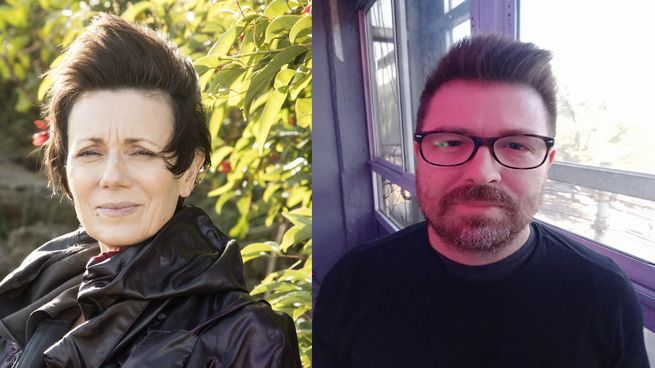With the large public call, the 14th edition of the Editors Fair (Fed) was held last weekend. We dialogue with two of the participating authors, María Sonia Cristoff and Edgardo Scott.
“How do novels read today?” (with Cristoff, Scott), “Nightmares for gauchoids” about how literature is being thought and rethinking now (with Mattio, Nieva), “How video games are changing the world” (with Didzgalvyte, Ruocco) were some of the fourteen talks of prominent narrators and essayists who enhanced the 14th Editors Fair (Fed) -of small and medium editorials, such as 21st century, Eternal Cadence and Godot, which ended last Sunday. The Fed grows year after year, this time with 330 stands and more visitors (31,000) who toured the Art Media, Corrientes and Dorrego, in the Chacarita neighborhood.
The content you want to access is exclusive to subscribers.
“It was a success in more than one sense. Fed allowed us to talk to readers, tell them what we are doing, those who project and know about their interests in the world of books,” says the editor Victor Malumianone of the organizers.
On the theme of “How are the novels read today?” We interviewed writers María Sonia Cristoff, Narrator, essayist, translator. His work “Waste” He won the National Novel Prize “Sara Gallardo”, and Edgardo ScottArgentine author resident in France. Narrator, essayist, psychoanalyst. He has just published “I am like the king of a rainy country. ” Both debated in the Fed.


María Sonia Cristoff: I have been thinking for a long time the whole set of texts that surround books and that are usually grouped under the name of paratexts, since they were designated by a French theorist last century. With paratexts I mean the back cover, the flap, the prologues, reviews, interviews. A textual production to which, with the irruption of digital life, posts, video, comments, threads, etc. are added. It is not that they are added as paratextual options but that they have much more weight, more importance in reading experience. Today it is very rare for someone to read a novel a little alone, in the sense of accompanied by their previous readings, but not much more. At most some recommendation or reading a criticism, and that in the case of the most specialized readers.
“Today you reach the book to the book itself with a lot of previous information that usually comes from channels in the networks,” continues the author. “It is read that much more group for a real experience of the collective. Which can have a very positive side, if we understand that group because From reading and leaves little space for each reader to make their own reading, be surprised with their own experience, open the multiple irradiations of meaning that a novel can have. “
Edgardo Scott: There are three ways in which the novels are being read, that is, fiction. The first is still very evasive, and is linked to gender. The novel, fiction, is finally read to entertain yourself, to evade reality, and therefore not to modify it. That is an intrinsic reading of the genre in commercial, industrial terms.
“Now,” he continues Scott “It seems to me that, in recent times, there is a very literal reading of the novels, that fictions have lost their metaphorical capacity, which made ‘Madame Bovary’ not only the story of an unfaithful woman, but we can find reading that novel not the narrative pretext, but a lot of other things. That pile of things means ‘Madame Bovary’ or, for example, ‘The shipyard’.
“Another reading that seems to me is a very ideologized,” adds the author, “that goes a bit on the same line. The novel is read in ideological key. Perhaps because we are at a time in the world very ideological, very polarized. There are two great ideological poles, and it is very difficult to escape, and be able to be critical of those two poles. In that way, many times the novels come as a military or to reduce those ideologies. Thus, but many times it is written like this.
Journalist: What relationship do you see in the use of fiction in the news and novelistic fiction that is not “based on real events” although it proclaims it?
Edgardo Scott.: We are at a time when the information is generated or self -generated by each one there is no longer a sources check, that Go in the Wind. Now there is talk of what a tweet of a retuit retune says, which then begins to circulate as a rumor. The rumor is something that is doing well, but not for the treatment of something documented or documentary. Today we seek to novelize known people or events that occurred. That occurs a lot in biographs and biographies. They seem to come to disassemble a myth and end up crystallizing it. When looking or reading that type of novelizations, the spectator or the reader ends up not knowing much more than he knew before having that experience of reader or spectator, and may have accepted unsustainable fictions. That is also another way of the political use of fiction.
Q.: What are they writing?
María Sonia Cristoff: I just finished a series of narrative essays that will be published in Chile by the Diego Portales publishing house. And I am finishing a novel that will come out next year in Random House in which the protagonist tries to resolve- precisely reading!- The enigma of an silenced death.
Edgardo Scott: A novel about my father, alcoholism and others, and “read badly”, an essay on reading.
Source: Ambito
I am an author and journalist who has worked in the entertainment industry for over a decade. I currently work as a news editor at a major news website, and my focus is on covering the latest trends in entertainment. I also write occasional pieces for other outlets, and have authored two books about the entertainment industry.




